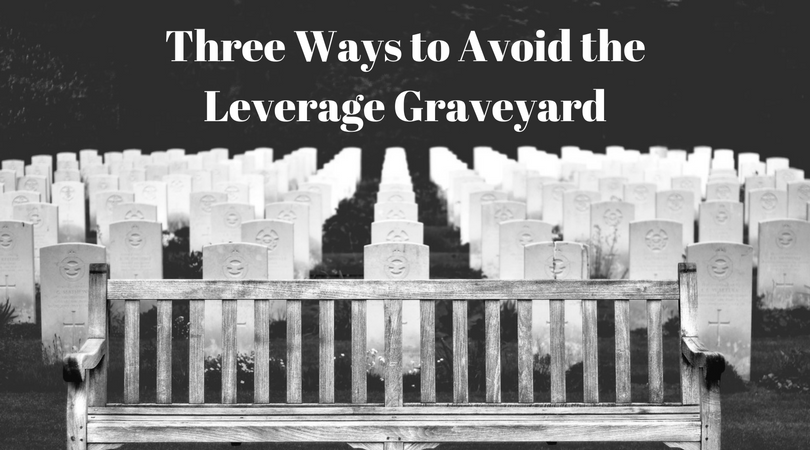
Leverage Graveyard Epitaph:
Here lies one Joe Schmoe
Dollars dead for stretching “dough”
Could have cashed out once or twice
Found out debt had hidden price.
This poem describes one of my closest friends. Let me tell you about him.
Just ten short years ago, he had it all. A wife of 25 years who stuck by him through thick and thin, two happy children pursuing their dreams, a dream house, nice cars, private planes, boats, global travel, and a thriving business that forced him to live on $1 million per year.
Today, his most precious assets are still in tact. He and his wife are still in love, his kids are happily married, and he enjoys regular quality time with his grandchildren. But monetarily, he's lost it all. And with it, much of his reputation and all of his momentum.
I recently interviewed him for this post. Here are three takeaways you can use to avoid a similar fate.
More...
1) If your Debt Can take you Down, it Will.

Even if your debt can ONLY take you down in extraordinary circumstances, it CAN still take you down. My good friend was under-leveraged by almost all standards. But when the financial crisis hit, it hit him hard.
Let me be clear, I'm not against using leverage to grow your business. To even suggest this would be hypocritical since I am the majority owner of a small business financing company. The key to healthy leverage is to use just enough to fuel your companies growth but not so much that it becomes a burden on cash flow. Both short-term and long-term debt has its use. Your CPA can provide custom analysis, but a good rule of thumb is to keep your debt to income ratio below 15%. Anything above 20% and you're heading for rough waters.
Leverage has its place. But if you don't want to lose it all, then don't do deals that require you to carry debt that can take you down. Long-term financial success has more to do with avoiding the big loss than it does making the big gain. Want financial success over the long-term. Avoid over-leveraging yourself, even if it means missing out on the "deal of a lifetime."
Summary
- Decline opportunities that require you to over-leverage yourself.
- Keep your debt expense below 2% of annual sales.
- It is more important to avoid the big loss than to make the big gain.
2) When you Can Get a Win, Grab it.

My friend is one of the most positive people I know. He’s not even mad at himself, but maybe he should be. He could have “cashed out” for $5 or 6 million in 2005, 2006, and early 2007. But instead, he rode his $30 million pony right into the ground. Now he carries the saddle. Turns out that having cash and its equivalents are a lighter load.
During our interview, he told me about another man he met at his local aviation center. He cashed out in early 2007 from the same business my friend was in and he’s thanking his “lucky stars” everyday that he chose to sell. Now he spends his days flying his small jet home from his Florida vacation home with his wife of 30 years.
In my experience, the percentage of people who regret taking less for their business than they think it is worth is far smaller and far, far less intense than the regrets of those who don’t sell and end up losing it all through unforeseen circumstances.
This doesn’t mean that everyone should sell. Some can set up their business as a self-sustaining, cash generating asset. I encourage this, and have several businesses like this myself. But be careful to allow for the hidden risks. Remember, “You may see absolutely no way a business can go bad, but when it does, you'll see perfectly clear.”
Summary
- Cash and its equivalents are a lighter load than debt and its burdens.
- You can keep your business as a producing asset, but allow for hidden risks.
- Far fewer regret cashing out than do holding and losing.
3) Leverage your Win and Build on it.

Take your wins and set them aside in a very safe place. Put them to work for you and build on your knowledge and momentum without keeping everything you have earned at risk. Self-directed IRA's are a great vehicle for growing your wins. I use two companies, IPlanGroup and The Equity Trust Company.
Configure your life where you can define a win and take it, store it and then build upon it. There are ways of doing this while staying in your same business, so don’t obsess about the “sell” language. Just make sure that you are cashing in on your wins.
Cashing in requires the appropriate mindset and good planning (with the necessary adjustments.) Get a team of inside-outsiders that will help you weigh the risk/reward options and will encourage you to cash in on your wins.
Summary
- Self-Directed IRA's are great vehicles for growing your wins.
- You don't have to sell 100% of your business to cash in on your wins.
- Cashing in requires help. Recruit a team to help you cash in on what you've built.
So, if you're fortunate enough to have built a winning business. Learn from my friend. Avoid over-leveraging yourself. Execute a strategy to cash in on your win over time. And, build a team to help you take money (and risk) off the table for future use and consumption.
If you've built a business that is winning, congratulations. You've reached a destination attained by few. Now, make sure you and yours can benefit from your business for generations to come. If you're looking for assistance in creating your exit, Pilot Fish may be able to help. Please contact us for a free consultation.
Thanks for reading. Keep on leading.
Josh
